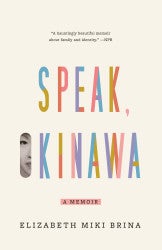Reading Group Center
- Home •
-
Books by Category •
- Imprints •
- Authors •
- News •
- Videos •
- Media Center •
- Reading Group Center
Newsletter
Sign up for the Reading Group Center Newsletter
Reading Group Resources
Reading Group Guides
Reading Group Tips
News & Features
Connect with Us
One Book, One Community
Community-based reading initiatives are a growing trend across the country, and we're pleased to support these programs with a wide range of resources.
A Q&A with Elizabeth Miki Brina, author of Speak, Okinawa

Buy the book | Read an excerpt
Elizabeth Miki Brina’s mother was working as a nightclub hostess on U.S.–occupied Okinawa when she met the American soldier who would become her husband. The language barrier and power imbalance that defined their early relationship followed them to the predominantly white, upstate New York suburb where they moved to raise their only daughter, Elizabeth. Decades later, Elizabeth comes to recognize the shame and self-loathing that haunt both her and her mother and attempts a form of reconciliation, not only to come to terms with the embattled dynamics of her family but also to reckon with the injustices that reverberate throughout the history of Okinawa and its people. Now available in paperback, Speak, Okinawa is a heartfelt exploration of identity, inheritance, and forgiveness.
Ripe for discussion on topics like immigration, identity, shame, and reconciliation, Speak, Okinawa would be an excellent pick for your reading group! And to help you get to know the author a bit more, here is a Q&A with Elizabeth Miki Brina, discussing everything from how she takes her coffee in the morning to how she celebrates her Okinawan heritage. She even poses her own question to reading groups. Enjoy!
Reading Group Center: What’s your go-to book recommendation?
Elizabeth Miki Brina: The Buddha in the Attic by Julie Otsuka.
RGC: How do you take your coffee?
EMB: Black.
RGC: Who/what inspires you?
EMB: My mother and father, always.
RGC: What is your favorite aspect of living in New Orleans?
EMB: People are very alive here. I feel like almost everyone I come across is working hard on a dream, not necessarily a big dream, an overly ambitious or materialistic dream, just a way to be able to make ends meet while doing what they love to do every day. I love how people love to talk, about themselves and their current projects, about you and your current project. People are open and responsive to each other’s dreams. Encouraging, collaborating, celebrating, commiserating.
RGC: How long did it take to write your memoir? What was the writing process like for you?
EMB: From direct start to final finish, about five years. Although I had been meandering and evading, writing snippets interspersed throughout previous essays for a lot longer, once I figured the focus of what I needed to write, the order and structure, most of it came together in a surge. I felt like I couldn’t stop. I felt like I couldn’t not write. And that felt powerful. The process was challenging and painful for sure, many frantic nights of sobbing from shame and doubt and frustration, but looking back, it was actually relatively easy. The material was there. So much material. And somehow I conjured a proper container to hold it. I just kept recalling, gathering, filling gaps, layering details. I felt compelled and bound to it, yet hardly any part of it felt forced.
RGC: How have you changed from the time when you first started writing your book until now?
EMB: Well, I’m six years older, and I suppose that’s a rather large span of change for anyone under any circumstances. Growing up has been petrifying and humbling, but I’m grateful for everything I learned about myself, my family and history, especially from writing the book. It’s a tremendous gift to be able to make one of my lifelong dreams come true, to be able to tell and share my story and have others read and react to it. I feel more seen, more explained and understood. I feel a weight lifted, but of course the weight is always replenishing. But maybe I’m better at bearing it.
RGC: What was it like researching the history of Okinawa and braiding it into the narrative of your memoir?
EMB: It was a combination of heartbreaking, illuminating, and healing. What happened and continues to happen to Okinawa is cruel and unjust. The fact that I didn’t learn this history, my history, until I was thirty-four years is cruel and unjust. I should have been told. I should have wanted to know a long time ago. But regardless of timing, learning my history allowed me to forgive my mother for the mistakes I once believed she made that I now realize weren’t her fault, and perhaps precisely because I learned it so late, I had more knowledge, more experience, a broader perspective. Perhaps I could more clearly see the connections between her life and my life, the lineage of trauma, how the systems of colonialism, racism, patriarchy affected her and me intricately and intimately.
RGC: What are some ways that you engage with and celebrate your Okinawan heritage today?
EMB: Remembering. Reaching out and keeping in contact with other Okinawans. Talking with my mother almost every day. I’m still trying to learn how to cook all the beautiful meals she cooks for me. I’m still trying to learn Japanese.
RGC: If you could pose one discussion question to book clubs reading SPEAK, OKINAWA, what would it be?
EMB: I’ve heard my book described as a “letter of apology,” which I believe is true. I wonder how this theme of apology and this approach of “writing toward forgiveness” becomes evident in my memoir, as well as memoirs in general.

